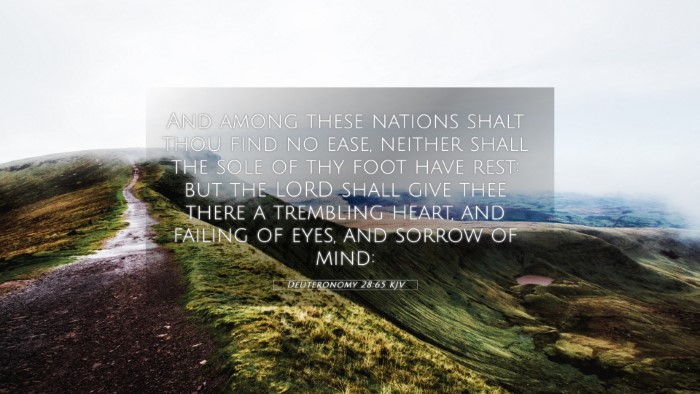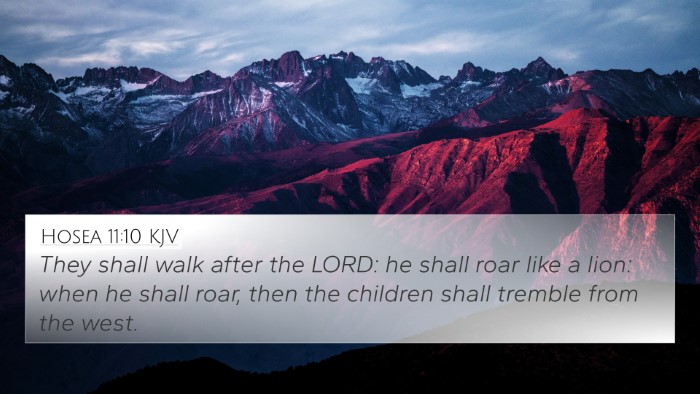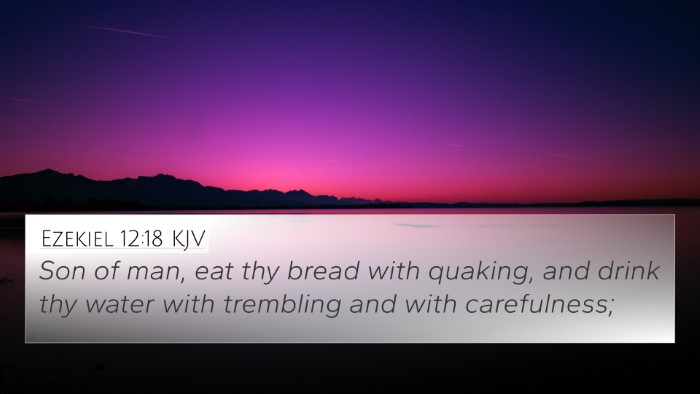Understanding Deuteronomy 28:65
Verse Context: Deuteronomy 28:65 states:
"And among these nations thou shalt find no ease, neither shall the sole of thy foot have rest: but the Lord shall give thee there a trembling heart, and failing of eyes, and sorrow of mind."
Summary of Meaning
This verse emerges from a section of Deuteronomy that articulates the consequences of disobedience to God’s command. It signifies a deep lamentation over the Israelites' inevitable suffering and turmoil due to straying from God's law.
Exegesis from Public Domain Commentaries
-
Matthew Henry:
Henry emphasizes the emotional and psychological turmoil implied in the passage. He suggests that the "trembling heart" symbolizes the deep fear and anxiety that results from being subjected to oppressive circumstances, reflecting a loss of peace and security.
-
Albert Barnes:
Barnes points out that the restlessness and sorrow may represent both physical displacement and spiritual desolation. The absence of ease suggests a profound disconnection from God’s favor, leading to emotional distress and hopelessness among the people.
-
Adam Clarke:
Clarke interprets the phrase "neither shall the sole of thy foot have rest" as a metaphor for the unending burdens that accompany divine judgment. He emphasizes the psychological effects of such burdens, leading to despair and sorrow, which become part of the Israelites' everyday experience in exile.
Conceptual Understanding
This verse presents a grim picture of the consequences of turning away from God’s commandments. The result is not only physical suffering but also mental anguish and emotional strife that propagates through the community.
Bible Verse Cross-References
Here are some connecting verses that share thematic relationships with Deuteronomy 28:65:
- Leviticus 26:36-39: Discusses fear and distress as consequences of disobedience.
- Jeremiah 29:4-7: Calls for peace and productivity in a foreign land amidst exile.
- Matthew 10:28: Advises against fearing those who can kill the body but not the soul.
- Lamentations 3:17-18: Expresses profound sorrow and loss of peace, akin to the trembling heart.
- Isaiah 51:12-13: Offers solace, emphasizing that God provides rest amid turmoil.
- Psalm 42:5: Reflects on deep sorrow and a longing for hope in God.
- Philippians 4:6-7: Encourages peace of mind through faith, contrasting the distress in Deuteronomy.
Connections with Other Bible Verses
There are several biblical themes explored in Deuteronomy 28:65 which are foundational to understanding the wider biblical narrative:
- Consequences of Disobedience: Seen in numerous passages throughout the Old Testament.
- Divine Judgment: The theme of judgment for turning away from God is prevalent throughout scriptures.
- Exile and Restoration: The journey of the Israelites in foreign lands and God’s promise of eventual restoration appears in many prophetic books.
- Emotional and Spiritual Distress: Other scriptures discuss the themes of mental and emotional anguish, often addressed through divine assurance and hope.
Exploring Thematic Connections
The themes found in Deuteronomy 28:65 provide numerous parallels throughout the Bible. They serve to illustrate how sin leads to sorrow and distress, while adherence to God’s commands offers hope, peace, and restoration. Understanding these connections through cross-referencing enhances the reader’s comprehension of biblical theology and narrative.
Tools for Bible Cross-Referencing
For those interested in deeper study and cross-referencing, utilizing a Bible concordance or a cross-reference guide can be highly beneficial:
- Bible Concordance: A tool that lists words alphabetically and provides places in the Bible where they occur.
- Bible Reference Resources: These can provide additional background and thematic analysis of various scriptures.
- Cross-Reference Bible Study: Methods that encourage pairing verses for comprehensive theological insights.
- Comprehensive Cross-Reference Materials: Resources that compile various texts based on shared themes or topics.
Practical Application
When studying Deuteronomy 28:65, it's crucial to recognize its implications for both historical context and modern application. It warns against the consequences of straying from God while offering a path toward lamentation and eventual redemption. Faithfully cross-referencing can help illuminate how this message is echoed throughout scripture and can serve as a guide for believers today.
Final Thoughts
Deuteronomy 28:65 serves as a powerful reminder of the spiritual and emotional ramifications of disobedience to God. Exploring this verse through public domain commentaries like those by Matthew Henry, Albert Barnes, and Adam Clarke, along with cross-referencing it with related scriptures, allows for a deeper understanding of its profound significance in the biblical narrative.



















